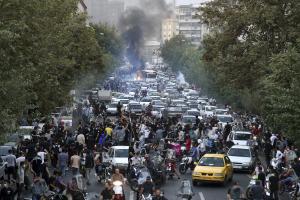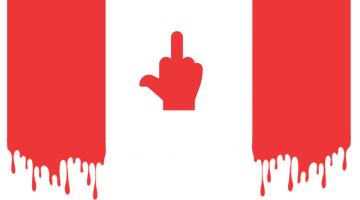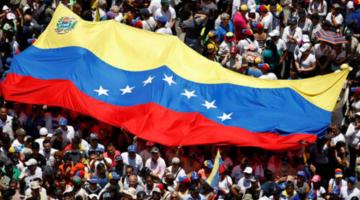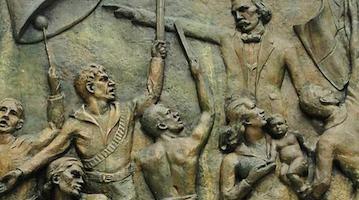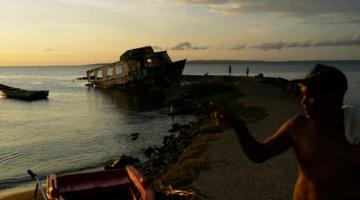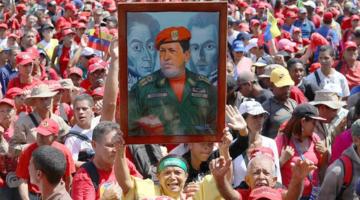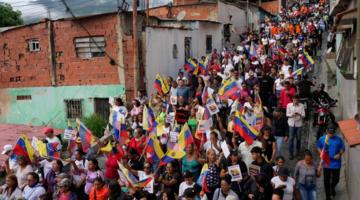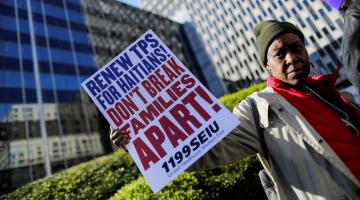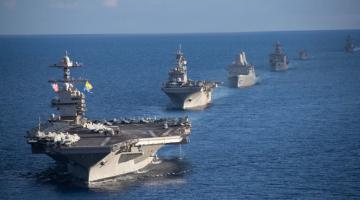Army members patrol in southern Quito. Photo: AFP/Getty Images
As Ecuador heads into a very important run-off election on April 13, the issues of security, state violence and the economy remain at the forefront for many Ecuadorians. Dollarization, submission to U.S. dictates, the proliferation of arms shipments through privately owned ports, and the expansion of international drug cartels to justify military presence have all combined to make the living conditions of the poorest unbearable, especially for African and indigenous communities with a constant war directed at them from the militarized structures of the state, like the case of the Guayaquil Four.
Black Agenda Report contributor Clau O’Brien Moscoso interviewed Grayzone correspondent and documentary filmmaker Oscar León on January 6, 2025, less than a month after the disappearance and later confirmed death of the four Afro-Ecuadorian boys in Guayaquil at the hands of sixteen Air Force members. Below is the final part of the interview; part one here and part two here.
CO: So with this current state of emergency all the way through next month's elections (first round), do you see that there's a possibility the election may not even happen?
OL: Look at the Electoral Tribunal - it's already stolen about 2 or 3 elections. Clearly Guillermo Lasso didn't win in 2021. The indigenous candidate (Yaku Perez) won, and they stole it from him. And we now have the confirmation. It just came out that that's exactly what happened. We won that one and they stole it. Then the next one, the Correista candidate,Andres Arauz, was going to win, and they came out with some scheme where it was alleged they received donations from narcos. So of course the media went nuts and they lost the election turned out later it was all a lie. (The man who alleged this has) been sued and everything.
Then the next election Luisa Gonzalez was going to win, even maybe in the first round and then the candidate Fernando Villavicencio was murdered, and they allowed the press to blame Correa, so they lost that one. So that's three elections right there. And let me top this off with saying that the brother of the President of the Supreme Electoral Organization was designated by Daniel Noboa as the assistant to the US Ambassador. So basically, he's in a cozy job in Washington. So between that, the press being 100% on their side, I think that there's a bleak, bleak chance that there are actually clean elections in Ecuador. It's yet to be seen.
The United States is counting because of the treaty they signed with Ecuador in 2022, because it's supposed to be for 10 years. There's no way to kick the United States out of Ecuador. First of all, they can put bases there, and have US soldiers in Ecuador. They can go and kill anybody, and they will not respond to Ecuadorian law. They will respond to their own superiors and military law. But this is just to show how much is on the table for the United States in this election in Ecuador. Because if the left wins, they're going to have to pack and leave. Do you see them leaving without a problem?
CO: Do you see this as a blowback to the so-called pink wave in the region of leftist and more popular governments? There are still the more explicitly socialist countries of Cuba, Venezuela, and Nicaragua and those are being sanctioned. What role do you see Ecuador playing in either trying to reconstitute the Lima Group to try to overthrow Venezuela or even what they're doing right now with Haiti. And Ecuador was pivotal in pushing forward the Multi Security Support Mission in Haiti, as a good little US puppet in the UN.
OL: What comes to mind is that before Moreno, there was UNASUR. It was like a European Union, if you will, but from South America where all the countries were, which was South America plus the Caribbean and Mexico. I was a journalist in Ecuador during this time, and in the presence of Chavez, Kirchner and the presidents that were there in the beginning, which directly challenged the United States. I heard them plan to create South to South institutions, meaning a South Bank that loans to Southern regions just for development, at no interest, and ruled South America. They wanted even a military union of the South. They had big plans for South to South development.
And now look at the situation thirteen years later. Correa is a fugitive in Belgium after a massive hunt, despite whatever his flaws, there is no reason for him to be persecuted. And now Evo Morales, he's being persecuted. They tried to kill him. The other day we did an interview with him. They tried to kill him, Christina Kishner, went after Lula with lawfare. He came out of jail because the judge opened his mouth when he shouldn't have in an interview and said that. Yeah, we have no evidence to put Lula away, and they had to release him. In the Ecuadorian case, Diana Salazar on CNN said it herself - “No, we didn't have any evidence” and the CNN anchor responded, “How is that? You put him away.” and she is forced to say “We had some evidence, but it wasn't as clear” so she tried to fix it.
Up to this point I thought he was guilty, but when she said that I started looking into it, and things started coming out. And now it's pretty apparent that they set him up. A year ago I would not have said that myself, but now, I can tell you there's plenty of evidence that they set him up. Chavez died with cancer - a very weird cancer. That's what happened to those who put such an important geopolitical challenge to the US regime.
So translate that to now, thirteen years later you have Ecuador. First of all, Lenin Moreno destroyed UNASUR as soon as he got there. The first thing that had to go was all those plans to unite South American nations. In fact, I think the left lost. The cultural battle was clearly won by the right, especially in South America. So no, I don't see them integrating any kind of union, as far as left wing or pro-workers governments.
Now you can expect Ecuador to support Israel, support Ukraine. Ecuador bought some Russian helicopters at some point and when Noboa got there, he wanted to look good to the Americans, I guess, or I'm not sure but they lied. “Oh, yeah, these helicopters are trash, and we're just going to give this trash away to Ukraine.” They mentioned the word trash, and then it came out in the press that no, it turned out they weren't trash. It was actually $100 million each helicopter and they were giving away 5 of those. Then Russia told Ecuador “You guys are giving our weapons to the Ukrainians.” So they started a boycott against Ecuadorian bananas, and guess who Ecuador's biggest banana client is - Russia. So yes right now, Ecuador is basically an unrecognized and unofficial State of the United States without any rights.
CO: What about the country's internal right wing? Aside from being in power within the Noboa Government. Do you see, for example, fascist groups, aside from these narco cartels, as a constituted right wing force?
OL: I don't think there's such a force in the right wing in Ecuador. it's never had a radical right wing youth movement. Maybe right now you have the most likely thing which would be the youth voting for Noboa, which is in itself pretty significant. This is people who live in cardboard houses voting for the guy who's the son of the guy who oppressed their parents all their lives. He pretty much is the reason why they live in those cardboard houses. But they vote for this guy, who has 50% of voter intention, or at least that's what they say, but let's say 30 or 40. It's still a lot in a country that's 90% poor, 90% indigenous or Africans; they have absolutely nothing in common with this Miami guy. (Noboa was born in Miami.) And his son was born in the US as well. The son of the President traveled to the United States to have a United States born son; there's nothing in common between them and any worker, yet he's about to win.
That tells you a lot about political manipulation, and the kind of confusion that the press manufactures, especially the resentment against the Correa government, particularly in the indigenous community. He was oppressing them because of the mines and that's what I was saying before, the left is separated because if he hadn't done that, the left in Ecuador would be 100% invincible. But the fact that Correa divided the left because of the mining conflict crushed the left’s chance to win.
But for the right - there's the Miami side of the right wing that's the old money using the US government to weaponize and gain power in Ecuador. Then you have the anti-Correismo which is in part because of Correa's own faults, but partly because of the press. It’s a reactionary movement against Correismo. The fact that they are now supporting Noboa is shocking because a lot of those anti-Correistas are poor people, workers who are voting for their nemesis. That's why in a country which has historically been racist like Ecuador, historically has been unjust with no recognition of human rights. Now you have this polarization that creates a new type of right wing, a right wing that is poor, voting against their own interest because figures like Milei or Trump managed to give it a certain flavor of radical revolutionary to right wing politics, where they are completely aggressive against their enemies.
That's the radicalism that Lenin put into the Russian Revolution. In fact, Milei himself quotes Lenin saying that without a doctrine, there's no revolutionary movement. So you see, that's why the right wing has managed to drum together this new phase of the right wing, which is not the old money that's in Miami. No, this is a new revolutionary right, mostly young who are tired of being oppressed, who were told “you're poor because of your specific fault, it's not a social fault, it's your individual fault.” But they don’t want to recognize that anymore. It is someone’s fault, and it’s the people below them. That's how Trump and Milei demonize the specific sectors who are the ones to blame for your unfortunate circumstances. That's why they weaponize the poor. They say “no, it's not your fault you're poor it's the Latinos in the United States, or the Arabs. That's the genius of the right wing to pass the buck.
*En Español*
A medida que se acercan las elecciones, los trabajadores pobres, africanos y colonizados de Ecuador bajo asedio
Mientras Ecuador se acerca a una segunda vuelta electoral muy importante el 13 de abril, los temas de seguridad, violencia estatal y la economía siguen siendo prioritarios para muchos ecuatorianos. La dolarización, la sumisión a los dictados de EE.UU., la proliferación de envíos de armas a través de puertos privados y la expansión de los carteles internacionales de droga —utilizados para justificar una mayor presencia militar— han combinado sus efectos para hacer insoportables las condiciones de vida de los más pobres, especialmente para las comunidades afro e indígenas, que enfrentan una guerra constante dirigida contra ellas por las estructuras militarizadas del Estado, como en el caso de los Cuatro de Guayaquil.
El 6 de enero de 2025, menos de un mes después de la desaparición y posterior confirmación de la muerte de los cuatro jóvenes afroecuatorianos en Guayaquil a manos de dieciséis miembros de la Fuerza Aérea, la colaboradora de Black Agenda Report Clau O’Brien Moscoso entrevistó al corresponsal de The Grayzone y cineasta documentalista Oscar León. A continuación, la tercera parte de la entrevista; la primera parte está disponible aquí y la segunda aquí.
CO: Con este estado de excepción vigente hasta las elecciones del próximo mes (primera vuelta), ¿crees que existe la posibilidad de que ni siquiera se realicen los comicios?
OL: Mira el Tribunal Electoral: ya ha robado unas 2 o 3 elecciones. Está claro que Guillermo Lasso no ganó en 2021. El candidato indígena (Yaku Pérez) ganó, y se lo arrebataron. Ahora tenemos la confirmación: acaba de salir que eso fue exactamente lo que pasó. Lo ganamos, y nos lo robaron. Luego, en la siguiente elección, el candidato correista Andrés Arauz iba a ganar, pero inventaron un esquema donde supuestamente recibió donaciones de narcos. Los medios se volvieron locos, perdió la elección y después resultó que todo era mentira. (El hombre que lo denunció) fue demandado y todo.
Después, en la siguiente elección, Luisa González iba a ganar, quizás incluso en primera vuelta, pero asesinaron al candidato Fernando Villavicencio y permitieron que la prensa culpara a Correa, así que perdieron. Ahí van tres elecciones robadas. Y para rematar: el hermano del presidente del Consejo Nacional Electoral fue designado por Daniel Noboa como asistente del embajador de EE.UU. Básicamente, tiene un cómodo puesto en Washington. Entre eso y que la prensa está 100% de su lado, las posibilidades de elecciones limpias en Ecuador son muy, muy escasas. Aún está por verse.
Estados Unidos está contando con el tratado que firmó con Ecuador en 2022, porque es por 10 años. No hay forma de echarlos. Pueden instalar bases y tener soldados en Ecuador, pueden matar a quien sea y no responderán ante la ley ecuatoriana, solo ante sus superiores y la justicia militar. Esto muestra lo que está en juego para EE.UU. en estas elecciones. Si gana la izquierda, tendrán que empacar e irse. ¿Crees que se irán sin problemas?
CO: ¿Ves esto como un retroceso de la llamada marea rosa en la región, de gobiernos izquierdistas y más populares? Aún quedan los países abiertamente socialistas como Cuba, Venezuela y Nicaragua, que están bajo sanciones. ¿Qué papel juega Ecuador en intentar reconstituir el Grupo Lima para derrocar a Venezuela, o incluso en lo que están haciendo ahora con Haití? Ecuador fue clave en impulsar la Misión Multinacional de Apoyo a la Seguridad en Haití, como un buen títere de EE.UU. en la ONU.
OL: Lo que viene a la mente es que, antes de Moreno, existía UNASUR. Era como una Unión Europea, pero de Sudamérica, donde estaban todos los países de la región más el Caribe y México. Yo era periodista en Ecuador en esa época, y en presencia de Chávez, Kirchner y los demás presidentes que desafiaron directamente a EE.UU., los escuché planear instituciones Sur-Sur: un banco del Sur para préstamos sin intereses, incluso una unión militar. Tenían grandes planes.
Y ahora, trece años después, Correa es un fugitivo en Bélgica tras una cacería brutal; Evo Morales es perseguido e intentaron matarlo; Cristina Kirchner sufrió lawfare; Lula salió de prisión porque el juez admitió que no tenían pruebas... Hasta en Ecuador, Diana Salazar dijo en CNN: "No teníamos pruebas", y la presentadora le respondió: "¿Cómo? Lo condenaron", y ella tuvo que rectificar: "Bueno, no eran claras".
Hasta ese momento yo creía que Correa era culpable, pero al escuchar eso, investigué y ahora es obvio que lo incriminaron. Hace un año no lo habría dicho, pero hoy hay pruebas. Chávez murió de un cáncer muy raro. Eso les pasó a quienes desafiaron geopolíticamente a EE.UU.
Ahora, trece años después, Ecuador destruyó UNASUR con Moreno. La izquierda perdió la batalla cultural. No veo una integración de gobiernos pro obreros. Hoy Ecuador apoya a Israel y Ucrania. Noboa regaló helicópteros rusos a Ucrania (mintiendo que eran "basura"), lo que provocó un boicot ruso a los bananos ecuatorianos. Ecuador es básicamente un Estado no reconocido de EE.UU., sin derechos.
CO: ¿Y la derecha interna? Más allá del gobierno de Noboa, ¿hay grupos fascistas o una derecha organizada, aparte de los carteles narcos?
OL: Ecuador nunca tuvo una derecha radical juvenil. Lo más cercano son los jóvenes que votan por Noboa, algo significativo: gente que vive en casas de cartón votando por el hijo del hombre que oprimió a sus padres. Él es la razón de su pobreza, pero tiene entre 30% y 50% de intención de voto. En un país 90% pobre, 90% indígena o afro, no tienen nada en común con este muchacho de Miami (Noboa nació allí, y su hijo también).
Esto habla de la manipulación política y la confusión fabricada por la prensa, especialmente el resentimiento contra Correa en comunidades indígenas por la minería. Si no hubiera dividido a la izquierda, sería invencible.
La derecha tiene dos caras: la vieja oligarquía de Miami que usa a EE.UU. para tomar el poder, y el anti-correísmo, alimentado por los errores de Correa y la prensa. Es impactante que pobres y obreros anticorreistas voten por su némesis. En un país históricamente racista, esta polarización crea una nueva derecha pobre, que vota contra sus intereses porque figuras como Milei o Trump le dieron un aura revolucionaria.
Es el mismo radicalismo que Lenin usó en la Revolución Rusa (¡hasta Milei lo cita!). La derecha ha logrado vender la idea de que "no es culpa del sistema, sino de los de abajo". Así demonizan a los más vulnerables: "No es tu culpa ser pobre, son los latinos o los árabes". El genio de la derecha es pasar la culpa.
Clau O'Brien Moscoso is an organizer and co-coordinator of the Black Alliance for Peace Haiti/Americas Team. Originally from Barrios Altos, Lima, she grew up in Kearny, New Jersey. She attended college, lived, and organized in New York City for 15 years, and is now based in Lima, Perú, writing about Latin America and the Caribbean for the Black Agenda Report.

